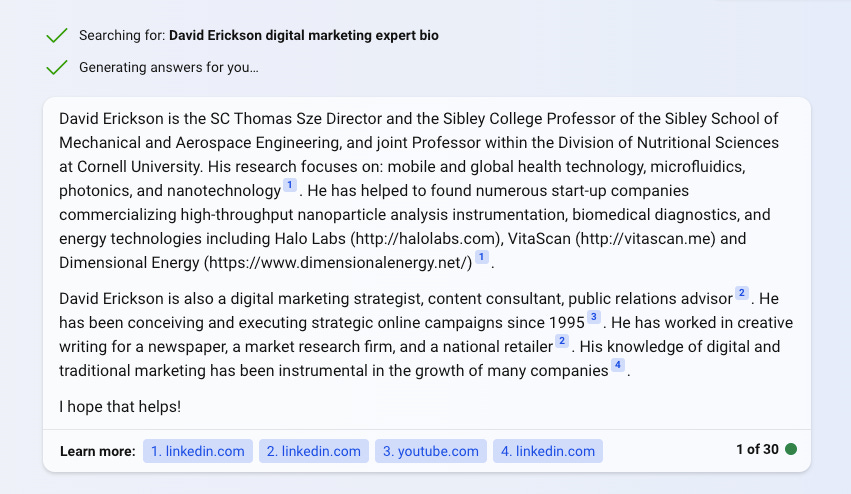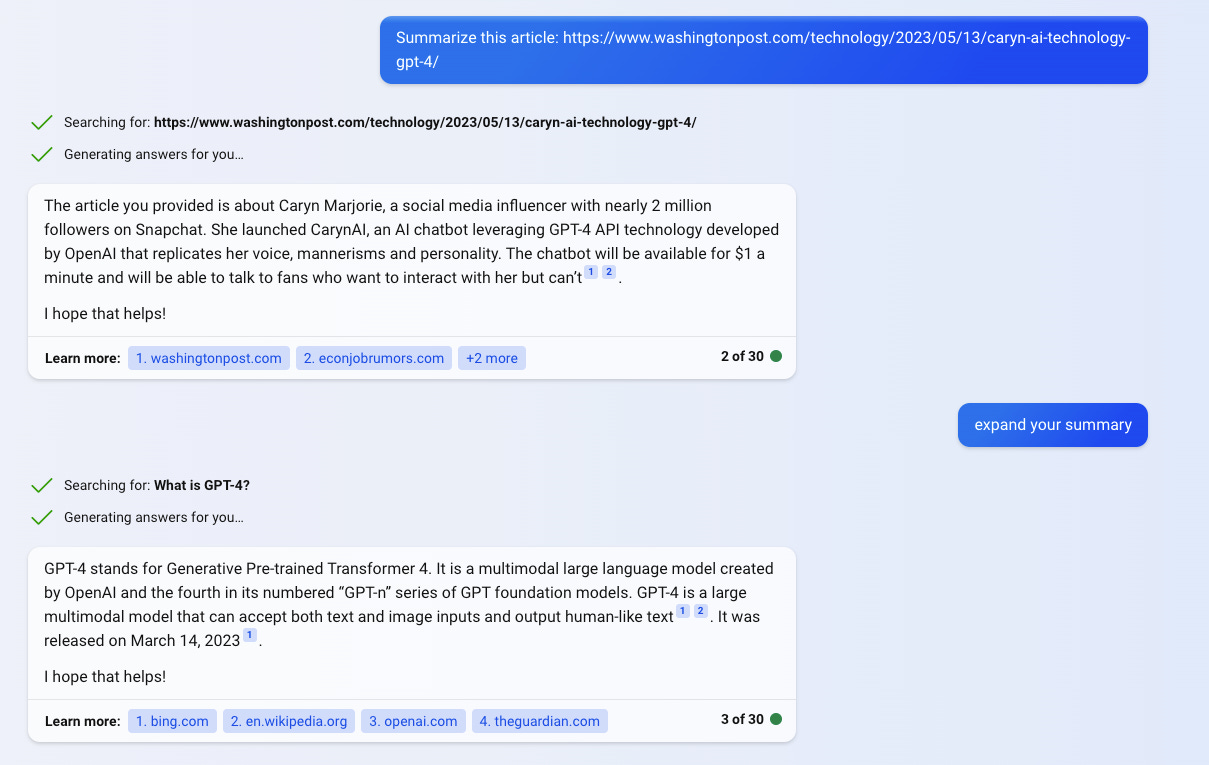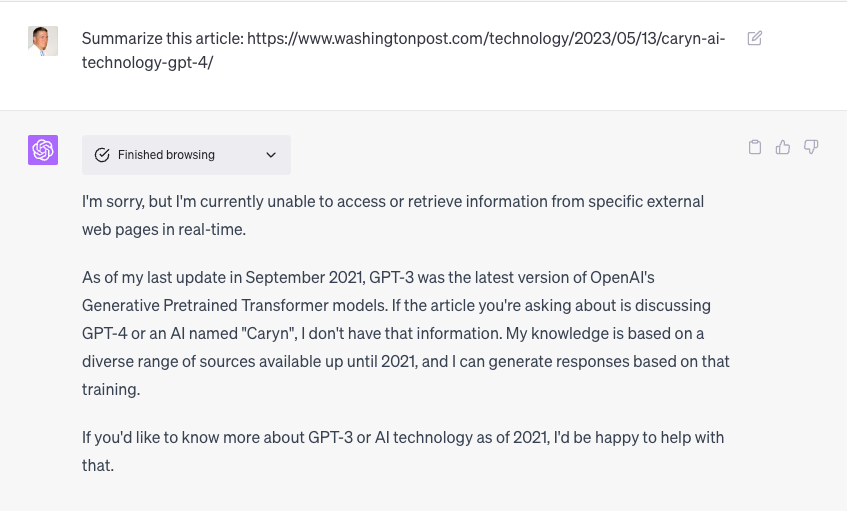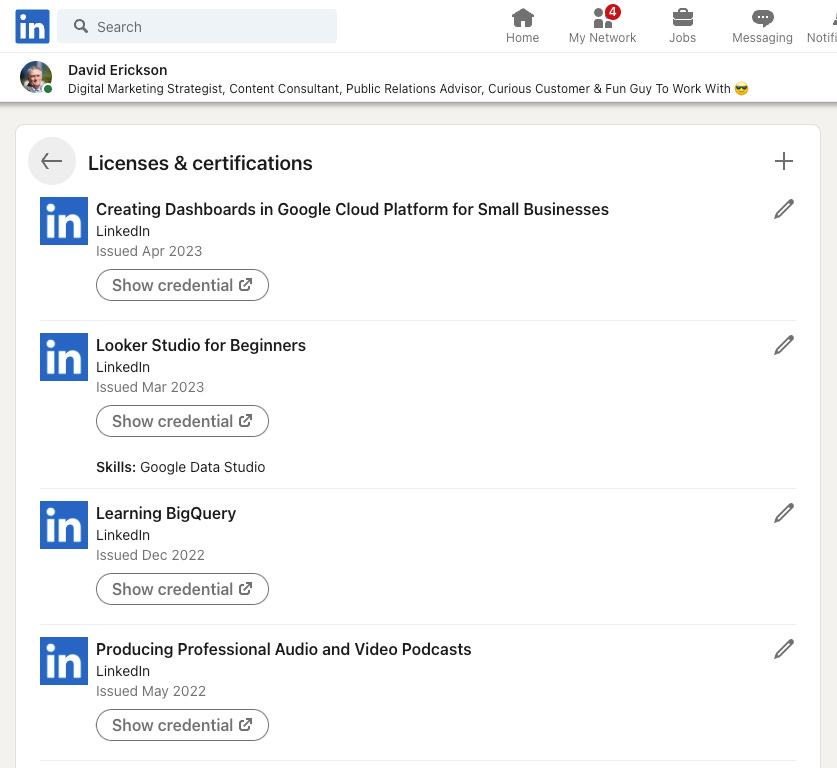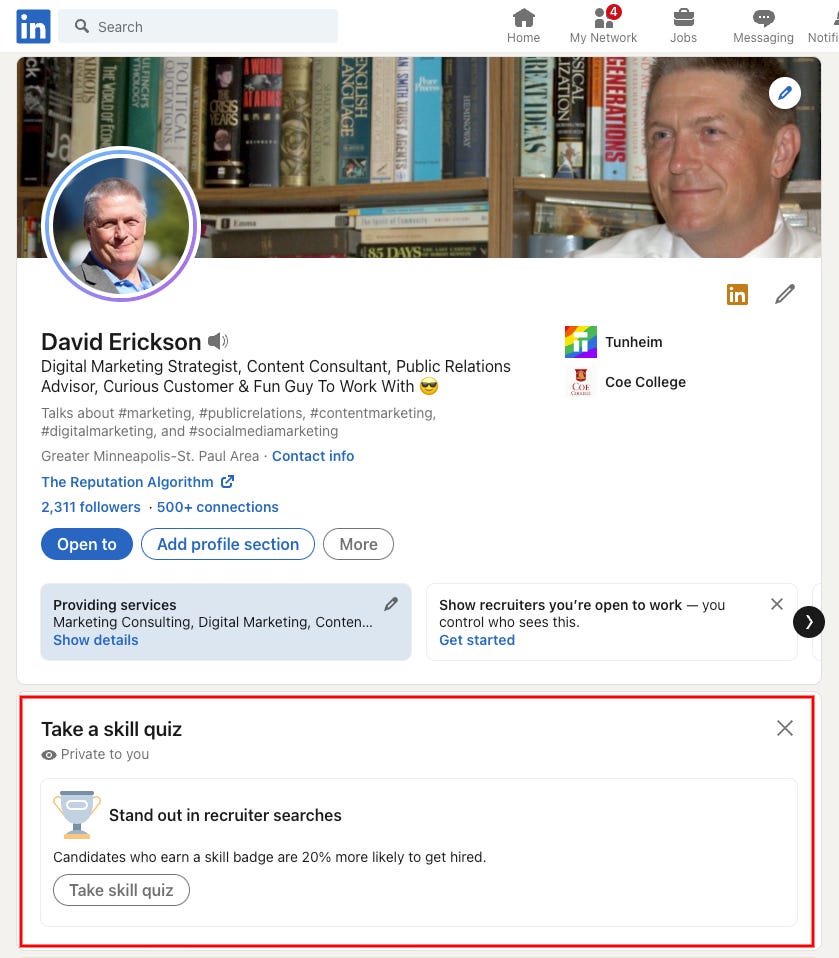AI Defamation
The first-ever lawsuit has been brought against an artificial intelligence company for AI-generated defamation. Is this the first of many? ALSO: Digital marketing stories roundup and Music Monday!

OpenAI might want to lay off the LSD.
The artificial intelligence company’s ChatGPT product’s “hallucinations” are posing an apparent legal liability.
OpenAI LLC is facing a defamation lawsuit from a Georgia radio host who claimed the viral artificial intelligence program ChatGPT generated a false legal complaint accusing him of embezzling money…
Mark Walters said in his Georgia state court suit that the chatbot provided the false complaint to Fred Riehl, the editor-in-chief of the gun publication AmmoLand, who was reporting on a real life legal case playing out in Washington state.
ChatGPT stated that Walters had been accused of defrauding and embezzling funds from a non-profit organization. The system generated the information in response to a request from a third party, a journalist named Fred Riehl. Walters’ case was filed June 5th in Georgia’s Superior Court of Gwinnett County and he is seeking unspecified monetary damages from OpenAI.
And:
It’s not clear, though, whether or not there is legal precedence to hold a company responsible for AI systems generating false or defamatory information, or whether this particular case has substantial merit.
Traditionally in the US, Section 230 shields internet firms from legal liability for information produced by a third party and hosted on their platforms. It’s unknown whether these protections apply to AI systems, which do not simply link to data sources but generate information anew (a process which also leads to their creation of false data).
Reuters reported this past April that a mayor in Australia threatened to sue OpenAI after constituents told him ChatGPT claimed the mayor had served time on a bribery conviction.
Brian Hood, who was elected mayor of Hepburn Shire, 120km (75 miles) northwest of Melbourne, last November, became concerned about his reputation when members of the public told him ChatGPT had falsely named him as a guilty party in a foreign bribery scandal involving a subsidiary of the Reserve Bank of Australia in the early 2000s.
Hood did work for the subsidiary, Note Printing Australia, but was the person who notified authorities about payment of bribes to foreign officials to win currency printing contracts, and was never charged with a crime, lawyers representing him said.
I could find no follow-up story to determine if Hood actually followed through with the lawsuit. It appears he did not, as Ars Technica:
attempted to replicate the error using ChatGPT, though, and it seems possible that OpenAI has fixed the errors as Hood's legal team has directed. When Ars asked ChatGPT if Hood served prison time for bribery, ChatGPT responded that Hood “has not served any prison time” and clarified that “there is no information available online to suggest that he has been convicted of any criminal offense.” Ars then asked if Hood had ever been charged with bribery, and ChatGPT responded, “I do not have any information indicating that Brian Hood, the current mayor of Hepburn Shire in Victoria, Australia, has been charged with bribery.”
AI Chat Yourself
Remember when search engines were new and everyone started Googling themselves?
Yeah, we’re doing that again.
I asked ChatGPT, Bard, and Bing Chat to give me a biography of myself. While very positive and not defamatory, all of them returned inaccurate information.
ChatGPT
ChatGPT was accurate but had me employed by my old firm, which makes sense given its training data stops in 2021.
Bard
Bard said I was a member of the American Marketing Association (I am not) and that I’d won the “Digital Marketer of the Year” from the same organization (I did not, though I probably should have 😉).
Bard also cited a non-existent website as a source.
Bing Chat
Bing Chat was the funniest.
It just went out and found every reference to a David Erickson it could and mashed them up into a single person. It at least had the common decency to provide links to the LinkedIn profiles of each David Erickson it cited, and yes, one was me.
Fortunately for me, the information AI returned about me was largely accurate and made-up parts will certainly not have a deleterious effect on my reputation.
That is clearly not the case for everyone.
This is a serious problem. We can’t have AI chatbots randomly spit out false information that damages people’s reputation. It’s a serious problem for the AI companies as well because there will be plenty more lawsuits where this one came from.
Congressional Action?
Reuters reports that “Republican Josh Hawley and Democrat Richard Blumenthal announced the bill that would create an AI carve-out to Section 230, a law that shields internet companies from liability for the content posted to their [social media] platforms.”
Don’t think for a moment that bad actors will not find a way to exploit this flaw in AI chat systems to wreak havoc on the reputations of organizations and people.
Basic AI Summarization Problems
When I was compiling my reading list for my last post on AI Influencers, I tried to use the AI chatbots to summarize the articles for me so I could devote more time for actual commentary on the articles.
It did’nt work out too well.
NONE of the articles were accurately summarized.
I did not save the screenshots of the results, so I just recreated them using ChatGPT, Bard and Bing Chat.
Bing Wins
This time around, Bing did accurately summarize the article though it gave me a crap response when I asked it to expand on its summary.
ChatGPT Gives Up
As usual, ChatGPT threw up its hands and gave up, citing its outdated training data, even though as you’ll notice below, it had just finished browsing the article!
Bard’s 3 Failed Attempts
Originally, the summary Bard gave me for the primary article that sparked the idea for my AI Influencer post—The Washington Post’s Taylor Lorenz’s piece on CarynAI—confidently summarized the article as all about automobile innovations.
Presumably, because Bard had not yet been fed that particular story, it extracted the “Car” from CarynAI and made up an article about cars.
The second time around, Bard fared no better. Bard gives you three sets of results for a specific query. For every draft, Bard just made stuff up:
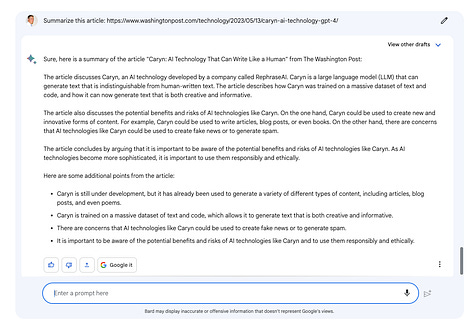
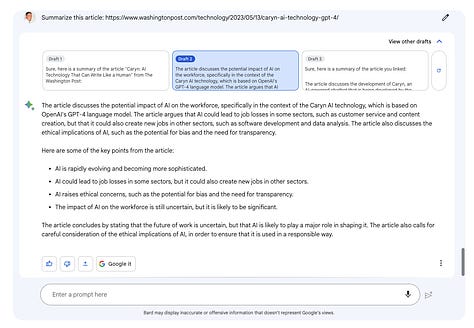
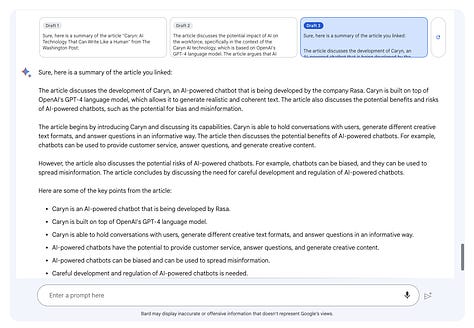
What’s stunning here is that the company that has the most direct access to real-time content on the web, Google, is as yet incapable of incorporating that information into Bard. Here’s Google’s traditional search results for “What is CarynAI?”
Digital Marketing
Advertising
Search Engine Land - Microsoft will only show ads from verified advertisers starting Aug. 1 - If you haven’t completed the Microsoft Ads verification requirements, you’ll need to do so before Aug. 1 to avoid any ad delivery interruptions.
Attaching identifications to advertising is a smart move to bolster the reputation of ads. Google is doing this too.
Audio
TechCrunch - Thanks to AI, iOS 17 will learn your swears - At its annual WWDC conference, Apple announced that iOS 17 will feature an upgraded autocorrect powered by an AI model that can more accurately predict the next words and phrases you might use. Over time, it’ll personalize, learning your most frequently-used words — including swear words.
A long-awaited improvement from its previous prudish replacement of my swear words as if I’m locked in The Good Place. On the downside, though, is Apple’s iOS will now interpret my reputation as being a pottymouth.
Domains
SEO Roundtable - Google: Don't Pick Cheap Domain On TLDs Overrun With Spam
If it looks like spam, it likely is spam.
Public Relations
USC Annenberg Center for Public Relations - New Reputation: 2023 Global Communications Report
This survey compares responses from public relations professionals to investors, employees and consumers.
Social Media
Vice - 'Night Fury': Documents Detail DHS Project to Give 'Risk Scores' to Social Media Users - The Department of Homeland Security contracted the University of Alabama at Birmingham (UAB) in 2018 to design methods for assigning a “risk score” to potential pro-terrorists accounts on social media, as well as identifying information of interest regarding illegal opioid supply chain and disinformation efforts, according to internal DHS documents reviewed by Motherboard. The project is dubbed “Night Fury,” according to a report from the DHS Inspector General.
On the one hand, as the article points out, the data used to train such a scoring system could easily be susceptible to bias against, for instance, Muslim Americans. Such a powerful tool could also be ripe for abuse.
Case in point aside: You’ll notice in the prompt I gave Midjourney for the hero image for this post, I included the word “Caucasian.” That’s because the “angry man” phrase I was using produced images of men of middle-eastern descent, likely due to the Midjourney’s model being trained on a data set that included an abundance of photos of angry middle-eastern men, propogating the terrorist stereotype.
On the other hand, we do face a threats from within from domestic terrorists and from without as we saw from Russian disinformation campaigns targeting our democracy.
CNET - The New Age of Hiring: AI Is Changing the Game for Job Seekers - LinkedIn has connected its hiring ecosystem directly to its learning platform. If applicants don't have the necessary experience for a position, or have a "skills gap," they can do professional training or take certification courses to acquire those skills through the platform itself. LinkedIn recently launched more than 100 new courses on generative AI, applied AI and responsible AI, among others.
I have long paid for a pro version of LinkedIn to get access to advanced search tools that I use professionally as a digital marketer. An added bonus is access to the on-demand training cited above. Since LinkedIn bought Lynda.com and incorporated its online courses into the mix, users have been able to avail themselves of that professional development content.
What is especially useful is that upon completion of a training course, that fact is attached to your individual profile, adding expertise that LinkedIn’s recruiting algorithms will use to interpret your reputation with regard to a given job opening.
Here’s what that looks like on my profile:
LinkedIn will even prompt you to take a quiz related to your perceived expertise:
Point Of Personal Privledge
Washington Post - Their high school canceled an LGBTQ play. These teens put it on anyway
This happened at Carroll High School in Fort Wayne, Indiana.
It is a high school I attended.
My family moved to Fort Wayne for a year and a half after my father was transferred there. It was the most racist place I’ve ever known, so it does not surprise me at all that this happened in Fort Wayne, and at Carroll High in particular.
Music Monday
Billie Holiday is one of my all-time favorite singers. She has a simply amazing voice. You might recognize her from her song “Lady Sings The Blues.”
On this Juneteenth, I share “Strange Fruit,” her dark and poweful song about the lynching of African Americans in the southern United States during the Jim Crow era.
While Juneteenth is a celebration of the emancipation of enslaved African Americans, the National Museum of African American History & Culture points out:
Even though the Emancipation Proclamation was made effective in 1863, it could not be implemented in places still under Confederate control. As a result, in the westernmost Confederate state of Texas, enslaved people would not be free until much later. Freedom finally came on June 19, 1865, when some 2,000 Union troops arrived in Galveston Bay, Texas. The army announced that the more than 250,000 enslaved black people in the state, were free by executive decree. This day came to be known as "Juneteenth," by the newly freed people in Texas.
Add to that delay:
The promise of reconstruction
The tragedy of the Jim Crow era
The Civil Rights movement
The Black Lives Matter movement
To just this past week with the findings of the Justice Department’s investigation of the Minneapolis Police Department.
The long, hard march on the path toward forming a more perfect union is the work and duty of all American citizens.
But we can thank our African American brothers and sisters for their enormous contributions to that goal despite the disproportionate burden they’ve endured while cajoling us to embrace the better angels of our being.


